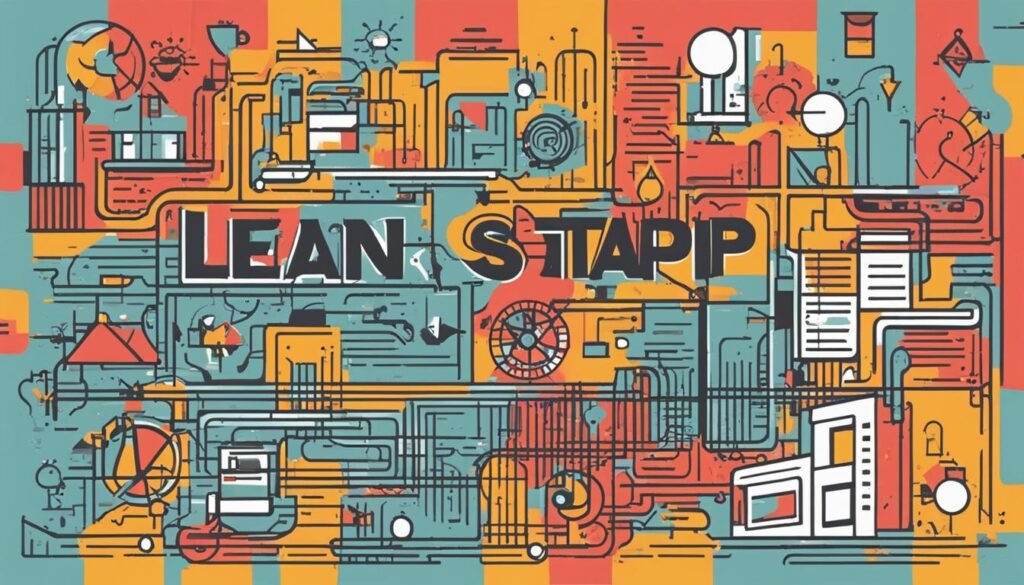
Entrepreneurship is a challenging and rewarding journey that requires a unique approach to innovation. Eric Ries’ book, The Lean Startup, offers a revolutionary methodology for startups to achieve success. The Lean methodology emphasizes creating a Minimum Viable Product (MVP) and iterating based on customer feedback to foster innovation.
In this article, we will explore the key principles of entrepreneurship and the Lean methodology. We will delve deep into the importance of testing assumptions, creating an MVP, and leveraging continuous learning to drive innovation. We will also provide practical tips for applying the Lean Startup principles to your own startup journey.
Eric Ries’ books on the Lean Startup are widely regarded as essential reading for entrepreneurs. His ideas and insights have helped countless startups to achieve success and grow sustainably.
Key Takeaways:
- The Lean Startup methodology emphasizes creating an MVP and iterating based on customer feedback to foster innovation.
- Testing assumptions and continuous learning are essential to the Lean methodology and startup success.
- Eric Ries’ books on the Lean Startup offer valuable insights and resources for entrepreneurs.
- Startup success requires a unique approach to innovation and a willingness to pivot when necessary.
- Applying the Lean Startup principles to your own entrepreneurial journey can increase your chances of success.
Understanding Entrepreneurship
Welcome to the exciting world of entrepreneurship! This section will explore the fundamentals of entrepreneurship and how it relates to the Lean Startup methodology. Entrepreneurship is the process of starting and building a business venture from scratch.
The Lean Startup methodology is a framework that revolves around creating an innovative product with a minimum viable product (MVP) and testing it with potential customers to determine market fit. The Lean approach emphasizes the importance of building a product that people actually want, rather than leaving it up to chance.
Key Principles of Entrepreneurship
To be a successful entrepreneur, it’s important to possess certain qualities and mindset. These include:
- Risk-taking: Entrepreneurs are willing to take risks and make bold moves to achieve their goals.
- Passion: Successful entrepreneurs are passionate about their business idea and are willing to work hard to make it a reality.
- Adaptability: Entrepreneurs are able to adapt to changing market conditions and pivot their business strategies accordingly.
- Resilience: Building a successful business requires overcoming obstacles and setbacks, so entrepreneurs need to be resilient and persistent.
The Role of the Lean Methodology in Startup Success
The Lean methodology has been shown to increase the chances of startup success. By testing assumptions and creating a minimum viable product, entrepreneurs can quickly determine whether their product is resonating with potential customers. This helps to reduce the risk of failure and saves valuable time and resources.
“The Lean Startup method teaches you how to drive a startup-how to steer, when to turn, and when to persevere-and grow a business with maximum acceleration.” – Eric Ries
In the next section, we’ll dive deeper into the Lean methodology and how it can be applied to your startup. But first, let’s take a moment to appreciate the entrepreneurial spirit and the willingness to take risks in pursuit of a dream.
The Lean Methodology
The Lean Startup methodology is based on the principles of Lean management and Agile development. It emphasizes the importance of testing assumptions early on in the development process and iterating based on customer feedback.
“The only way to win is to learn faster than anyone else.”
One of the key components of the Lean methodology is the Minimum Viable Product (MVP). The MVP is the simplest version of a product that can be created to test assumptions and gather feedback from customers. By creating an MVP, startups can validate their assumptions and make informed decisions about their product development roadmap.
“By the time a product is ready to be shipped, many of its features will be unnecessary or will have to be changed significantly in response to customer feedback.” – Eric Ries, The Lean Startup
To implement the Lean methodology, startups should focus on building a culture of continuous learning and experimentation. This means being open to feedback, testing new ideas, and iterating quickly based on what works and what doesn’t.
Another important aspect of the Lean methodology is the concept of the Build-Measure-Learn feedback loop. This process involves building a product, measuring its effectiveness through customer feedback and analytics, and then using that data to inform future iterations and improvements.
The Lean methodology not only helps startups create better products but also helps them do so more efficiently and effectively. By testing assumptions early on and iterating based on feedback, startups can avoid wasting time and resources on features that customers don’t need or want.

- Key takeaways:
- The Lean methodology is based on principles of Lean management and Agile development.
- The Minimum Viable Product (MVP) is the simplest version of a product that can be created to test assumptions and gather feedback from customers.
- The Lean methodology focuses on building a culture of continuous learning and experimentation.
- The Build-Measure-Learn feedback loop involves building a product, measuring its effectiveness, and using data to inform future iterations and improvements.
Innovating through Lean Startup
The Lean Startup methodology encourages innovation by prioritizing the creation of value for customers. This approach entails identifying and solving customer problems through continuous learning and experimentation.
“Innovation is the process of translating an idea or invention into a product or service that creates value for which customers will pay.”
Innovation is not just about coming up with new ideas; it’s about creating something that solves a problem and brings value to customers. The Lean Startup methodology provides a framework for achieving this goal by testing assumptions and gathering feedback from customers.
Through the Lean Startup approach, you can identify the unique needs and pain points of your customers. You can then create a Minimum Viable Product (MVP) with only the essential features needed to address those needs. This can help you avoid developing a product that nobody wants and ensure that you’re on the right track from the beginning.
Once you have your MVP, you can use customer feedback to iterate and refine your product. This iterative process allows you to continually innovate, and it helps ensure that you’re constantly meeting the evolving needs of your customers.
The Lean Startup methodology encourages experimentation and taking calculated risks. This approach helps you stay agile and adaptable, allowing you to pivot if necessary. By embracing innovation and experimentation, you can create a culture of continuous learning and improvement within your startup.
Applying the Lean methodology to your startup can help you create innovative products that solve real problems for your customers. By prioritizing customer needs and learning from feedback, you can create a culture of continuous improvement that drives innovation and success.
Building a Minimum Viable Product (MVP)
One of the key concepts of the Lean methodology is the development of a Minimum Viable Product (MVP). An MVP is a product with the minimum number of features required to validate assumptions and gather user feedback. It allows startups to test their ideas with a target customer base, without investing too much time and resources into a product that may not have a demand in the market.
The MVP concept is critical in the Lean methodology as it encourages entrepreneurs to focus on what the customer needs, not what they assume the customer wants. By getting feedback from a small group of early adopters, startups can iterate and improve their product, making it more valuable to the customer, and ultimately increasing their chances of success.
In building an MVP, it’s important to identify the core features that are essential to the product’s success. These features can be determined by conducting customer interviews and usability testing. From there, startups can develop a prototype with only those key features, test it with a small group of early adopters, gather feedback, and iterate.
Key Takeaway:
“Creating a Minimum Viable Product (MVP) is an essential step in the Lean methodology. It allows startups to test their ideas with a target customer base, without investing too much time and resources into a product that may not have a demand in the market.”
By building an MVP, startups can save time and resources in the development process, as well as get valuable feedback from their target audience. This allows them to iterate quickly, make improvements, and ultimately develop a product that meets the needs of their customers.
Next, we’ll explore the factors that contribute to startup success and how the Lean methodology can increase your chances of achieving it.
Achieving Startup Success
In today’s fast-paced business world, achieving startup success can be challenging. According to statistics, 90% of startups fail, and only a few reach unicorn status. However, the Lean Startup methodology can increase your chances of success by providing a systematic and iterative framework for developing your startup.
The key to achieving startup success with the Lean methodology is to embrace a continuous learning mindset. By testing assumptions and gathering user feedback, you can quickly iterate your product or service based on customer needs and preferences. This approach reduces the risk of launching a product that nobody wants and increases the likelihood of success.
Iterative Process
The iterative process is at the heart of the Lean methodology. By breaking down your product development into small, iterative cycles, you can quickly test and validate your assumptions. The iterative process involves building a Minimum Viable Product (MVP), validating it with users, and iterating based on user feedback.
The iterative process helps you to avoid the pitfalls of investing too much time and money into building a product that nobody wants. Instead, you can focus your resources on building a product that solves real customer problems.
Pivot Points
Pivot points are critical moments in your startup’s journey where you need to make a strategic decision. These pivot points occur when you have gathered enough user feedback to know that you need to change course.
“A pivot is a change in strategy without a change in vision” – Eric Ries
Pivot points can be challenging because they require you to admit that your initial assumptions were wrong. However, embracing pivot points can be the difference between failure and success. By pivoting, you can redirect your resources towards a more successful product or service.
Scaling Your Business Effectively
Once you have validated your product and achieved product-market fit, it’s time to begin scaling your business. Scaling your business effectively requires you to have a deep understanding of your customers’ needs and preferences.
The Lean Startup methodology provides a framework for scaling your business without losing sight of your customers. By continually gathering user feedback, you can make data-driven decisions that lead to sustainable growth.
In conclusion, achieving startup success requires a continuous learning mindset, embracing the iterative process, making strategic decisions at pivot points, and scaling your business effectively. By following the principles of the Lean Startup methodology, you can increase your chances of success and build a sustainable business that solves real customer problems.
Eric Ries’ Books on Lean Startup
Aside from The Lean Startup, Eric Ries has authored several other books that provide a deeper understanding of the Lean methodology and its applications.
The Startup Way: How Modern Companies Use Entrepreneurial Management to Transform Culture and Drive Long-Term Growth
In this follow-up to The Lean Startup, Ries applies his methodology to large corporations, demonstrating how they can adopt a startup mindset for long-term growth and innovation. The book includes real-world case studies and practical guidance for implementing entrepreneurial management strategies.

The Lean Startup Conference
This book provides a comprehensive guide to the Lean Startup methodology and features insights from prominent entrepreneurs and thought leaders. It includes practical advice and case studies from startups of all sizes and industries, as well as strategies for overcoming common obstacles.
The Lean Entrepreneur: How to Build a Successful Business Using the Lean Business Model Canvas
In this book, Ries introduces the Lean Business Model Canvas, a tool for visualizing and testing business ideas. He also provides guidance on how to use the Lean methodology to build a successful business from the ground up.
“The Lean Startup isn’t just about how to create a more successful entrepreneurial business; it’s about what we can learn from those businesses to improve virtually everything we do. I imagine Lean Startup principles applied to government programs, to healthcare, and to solving the world’s great problems. It’s ultimately an answer to the question ‘How can we learn more quickly what works, and discard what doesn’t?'” – Tim O’Reilly, Founder and CEO, O’Reilly Media
Overall, Eric Ries’ books offer valuable insights and practical guidance for implementing the Lean Startup methodology in any industry or organization. From startups to large corporations, the Lean approach has proven to be an effective way to drive innovation and achieve long-term success.
Applying Lean Startup Principles
Now that you have learned about the Lean methodology and its importance in achieving startup success, it’s time to apply these principles to your own entrepreneurial journey. Here are some practical tips and strategies to implement lean practices in your startup:
1. Test Your Assumptions
One of the key principles of the Lean methodology is testing assumptions. To do this, start by creating a list of assumptions you have about your target audience, customer needs, and your solution to meet those needs. Then, design experiments to test these assumptions and gather data to validate or invalidate them. This process can help you make data-driven decisions and avoid wasting time and resources building a product that nobody wants.
2. Build in Small Increments
Instead of building a complete product upfront, create a Minimum Viable Product (MVP) with only the essential features necessary to validate your assumptions and collect feedback from early adopters. This approach allows you to test and iterate on your product in small increments, minimizing risk and maximizing learning along the way.
3. Listen to Customer Feedback
Your customers’ feedback is a crucial component to the Lean methodology. Actively listen to feedback, both positive and negative, and use it to improve your product and inform your decisions. Utilize customer surveys, interviews, and analytics to gain insights and make data-driven decisions.
4. Embrace Failure
Failure is a natural part of the startup journey. The Lean methodology encourages you to embrace failure as an opportunity to learn and iterate. Don’t be afraid to try new things, fail fast, and move on to the next experiment.
5. Iterate Continuously
The iterative process is at the core of the Lean methodology. Continuously test, learn, and iterate on your product to improve its value proposition, user experience, and scalability. This process allows you to adapt to changing market conditions, customer needs, and technological advancements.
“The only way to win is to learn faster than anyone else.” – Eric Ries
By applying the Lean methodology, you can increase your chances of startup success. Remember to test your assumptions, build in small increments, listen to customer feedback, embrace failure, and iterate continuously. With persistence, hard work, and a willingness to learn, you can achieve your entrepreneurial goals.
Conclusion
Eric Ries’ book, The Lean Startup, has revolutionized entrepreneurship and product innovation. The Lean methodology, with its focus on testing assumptions, creating a Minimum Viable Product (MVP), and iterating based on customer feedback, has become a pivotal strategy for startup success.
Throughout this article, we have discussed the fundamentals of entrepreneurship and the key principles and mindset needed for startup success. We have explored how the Lean Startup approach encourages innovation, and how to identify and solve customer problems. Additionally, we have learned how to develop a Minimum Viable Product (MVP) with essential features to validate our assumptions and gather feedback.
Startup success is achievable by applying the Lean Startup principles. By understanding the iterative process, pivot points, and scaling your business effectively, you can increase your chances of success. Eric Ries’ books on Lean Startup offer additional resources to expand your knowledge and understanding of the Lean methodology.
In conclusion, entrepreneurship, the Lean methodology, innovation, and the concept of the Minimum Viable Product (MVP) are essential for achieving startup success. By applying these principles, you can create a successful startup that continuously innovates and grows. Let Eric Ries’ book, The Lean Startup, and his other resources, guide you on your continued journey towards success.
RELATED POSTS
View all


